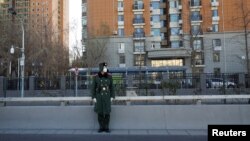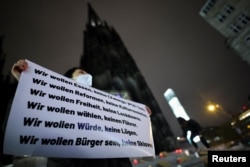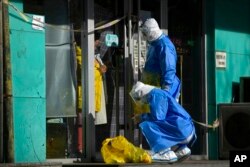With China seeing the biggest anti-government protests since 1989, analysts say African governments are watching closely, mainly with economic concerns.
For the past few days, the eyes of the world have been on the outbreak of mass protests in cities across China, with demonstrators furious at continued strict COVID-19 lockdowns as part of President Xi Jinping's unpopular "zero-COVID" policy.
The protests have also taken on a political angle, leading to comparisons to Tiananmen Square, with protesters being heard shouting: "Step down, Xi Jinping! Step down, Communist Party!"
The U.S. and German governments have said they support the right of peaceful protest in China, but from Africa there has been silence.
Still, African governments — while they are unlikely to either denounce or support the protests — will be paying close attention because China is the continent's largest trade partner, said Cobus van Staden, cofounder of the China Global South Project, which examines China's engagement with Africa.
"In relation to the African responses to it, I think they'll probably be muted, and they'll mostly be concentrating on how the impact is, of the disruptions on ... kind of on commodity trade, for example," he said.
Paul Nantulya, a researcher at the U.S. Defense Department's Africa Center for Strategic Studies, said there are "high stakes" on the African side in terms of the zero-COVID policy and its effects on supply chains.
"There is a concern, obviously on that African side, that some of this trade might be disrupted if these lockdowns continue," he said.
As for democratic South Africa saying anything in support of the protesters, Steven Gruzd, from the South African Institute of International Affairs in Johannesburg, said Pretoria was more likely to take a neutral stance similar to its position on the conflict in Ukraine.
"South Africa's not going to publicly call out China, South Africa's going to keep quiet I think and not interfere," he said. "I certainly don't think they're going to give support to the protests, this is after all their BRICS ally and their largest trading partner."
Contacted for comment on the protests by VOA, two spokesmen for South Africa's Department of International Relations and Cooperation said there was no reaction from the department.
In neighboring Zimbabwe, a longtime ally of Beijing, the spokesman for the ruling ZANU-PF party, Chris Mutsvangwa said, "As a matter of policy ZANU-PF does not interfere in the internal affairs of other United Nations member countries."
Only in Eswatini, formerly known as Swaziland, the sole major African state that supports Taiwan and does not have relations with Beijing, Percy Simelane, the spokesman for the king's office, said of the Chinese protests, "We believe in freedom of expression for all nations and societies."
Aside from the lack of government reaction, media coverage of the protests on the continent has also been muted. Outlets across the region are mostly picking up news articles from the international wires, with very few local op-eds on the nature of the dissent.
However, Kenyan and South African newspapers this week both ran original copy on how their local currencies and economies stood to be affected by the unrest. They focused on fuel prices and exports.
There has been silence from the Chinese state media too, but that might change if the protests continue, Nantulya said.
"One can expect that over the next few weeks China is really going to up the ante. It does have a sizeable media infrastructure and architecture on the continent of Africa, and we can be sure that it will make maximum use of the capability to regain the narrative, to control the narrative, and essentially to discredit the protests and whichever African sympathies might be out there," Nantulya said.
For now, Chinese police are out in force and officials have warned of a "crackdown," but there are also indications the government may be looking at softening COVID restrictions.






